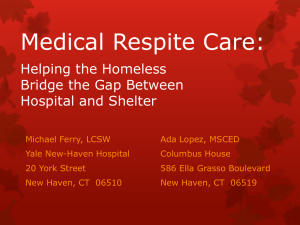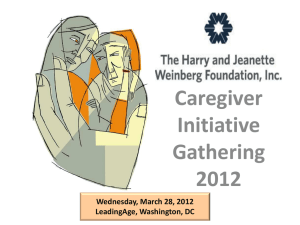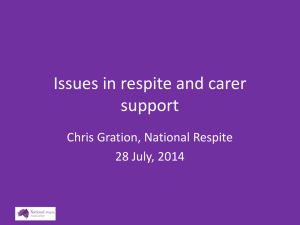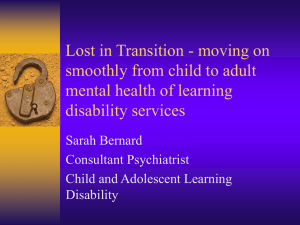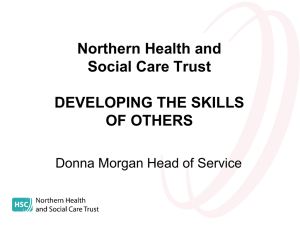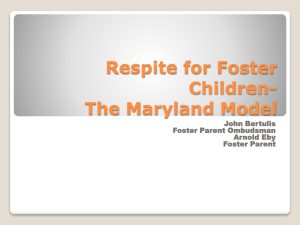What Can You Do With Respite? - National Health Care for the
advertisement
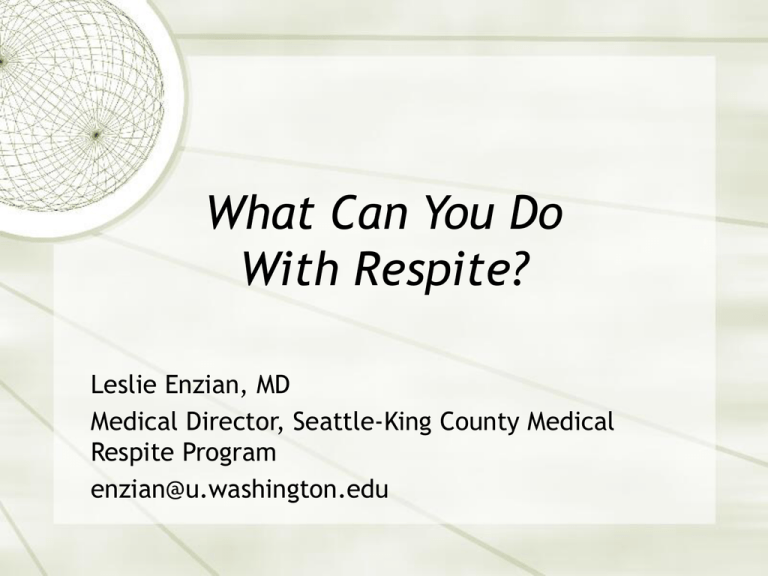
What Can You Do With Respite? Leslie Enzian, MD Medical Director, Seattle-King County Medical Respite Program enzian@u.washington.edu It Depends Upon . . . Local Resources Bed availability Facility Staff disciplines Funding stipulations Mission/philosophy Seattle King County’s Medical Respite Program Respite Focus Short-term care for medically ill or injured homeless patients Goals: ◊ Resolution of acute medical process ◊ Bridge the gap between hospitals and shelters ◊ Window of opportunity to engage into services ◊ Initiate the process of lifestyle stabilization ◊ Decrease hospital utilization and costs Potential Roles Fill the service gap between hospitals and shelters Fill the service gap between hospitals and clinics Fill the service gap between SNF and shelters Acute Care 48 yo male presents to the ED with alcohol intoxication and LLE cellulitis and wound. Recommended to have 10 days of antibiotics treatment and daily wound care. What Can Respite Offer? Monitoring for resolution of infection Daily wound care CD counseling and follow up Mental Health Screening and care TB Screening Vaccinations Housing Assistance Primary Care referral Seizing the Opportunity to Affect Long-term Change 52 yo male referred for leg wounds. PMH: Chronic lymphedema with recurrent wounds, HTN, Schizophrenia SH: Homeless since 1970’s, sleeps on mat at shelter, resistant to engaging Discharge timing? 63 yo female presents to ED with nausea, chills and generally feeling poorly Can’t recall her medical history Chart indicates h/o schizophrenia and sarcoid disease Off all meds, disengaged from all care SH: Staying in various emergency shelters Exam: 5X5cm irregular breast mass, scabies rash, flat affect with delayed responses to questions Labs: Unrevealing What Do You Do? Schedule patient for outpatient mammogram/breast clinic follow-up? Admit patient for a inpatient work-up? Admit the patient to Medical Respite for a diagnostic work-up and formulation of a treatment plan? Subacute Care in Respite Diagnostic evaluations for disenfranchised patients Pre-procedural care for colonoscopy or elective surgery Care during intensive treatment regimens (chemo, radiation Rx) Hospice care 29 yo male in respite for twice daily wound care Likes to sleep in, won’t get out of bed for nursing visits--takes lengthy cajoling Nurse has 10 other patients to see and feels lack of time What Can You Do? Give patient a warning then discharge next time he declines to see the nurse Team intervention to review admission agreements, negotiate a behavioral contract Impact: Tying up a bed from a patient that might need, and cooperate with, care Behavioral difficulties Readmission criteria stipulations Defined behavioral management process Predetermined discharge dates Venue for discussion and support with staff 52 yo male in respite for a mandible fracture. Client is angry and uncooperative Client uses physically intimidating postures and makes a physically threatening comment to nursing staff Staff and patient safety top priority Safety in Respite De-escalation training Limit setting early Safety measures: alarms, coordinated show of support, room set-up 2 staff presence Zero tolerance for racial or sexual harassment Venue for support, venting, discussion 46 yo male with EtOH dependence, diabetes, infected foot ulcers Sleeps in the woods In an actively abusive relationship Never consistently engaged in care Admitted to respite, received wound care, continued to drink heavily, noncompliant with NWB, ulcers did not heal Referred for primary care, mental health 2 toe amputation recommended Transported to hospital but never arrived for admission Few weeks later showed up from the woods for a scheduled primary care appt. Wound was larger, dirty and grossly infected, was off diabetic Rx, intoxicated Partial foot amputation Hospital calls to refer him back to respite What Do You Do? Decline admission because of non- compliance Readmit to respite? Respite Course Drank daily across the street from respite Attended most respite nursing visits for wound care, functioning in group setting, blood sugars not wildly out of control, mostly complied with NWB Supervising nurse daily reports of drinking Pt not discharged from respite, eventual shelter discharge after considerable wound healing Focused Expectations Nursing felt pt sabotoged health and respite care unsuccessful Admission was great success! Patient did not get wound infection/leg amputation Often can’t effectively fix maladaptive lifestyle issues, but can prevent serious complications from an acute process How to Support Successful Process? Difficult to witness self-destructive behavior Clarify case goals with team Weigh impacts of various decisions Offer venue for venting, discussion, support Training on harm reduction Treatment Compliance Patient won’t take BP meds Patient discharged on a new diabetic medication regimen and won’t follow it Do you contract then discharge these patients? What is primary Rx goal? How can you maximize success and impact? Educate, engage, refer for primary care 54 yo female with history of BAD with COPD exacerbation Off psych meds, unwilling to engage in mental health care Not taking Rx prednisone and antibiotics Patient is agitated, angry and uncooperative with respite care and unresponsive to behavioral contract Patient is discharged by respite due to behavior The Patient is referred again in 2 months for COPD Did you put the patient on a respite bar list? If barred, how long would bar last? Could the patient be put on a “Readmission Criteria” list stipulating that she in stable on psychiatric meds, engaged in mental health care and contracts to cooperate with care? 45 yo male with pneumonia and heroin dependence The patient admits to continued daily heroin use Patient is behaviorally appropriate in the respite space Attends all nursing visit except for one What Are Your Options? Perform a urine toxicology screen and discharge patient if positive Perform a urine toxicology screen and contract patient to maintain sobriety, discharge at next (+) utox Continue to engage patient in discussion around use and options for treatment Implications of these various options 52 yo heroin dependent patient referred for abscess wound care Pt underwent operative drainage of abscess and has a 20 X 10 X 5 cm buttock wound Patient was on high dose methadone and prn oxycodone in the hospital Hospital prescribes 30 pills of oxycodone at discharge Questions? Potential problems? How will patient’s pain be managed? Do you ask the hospital to Rx higher dose and quantity of narcotics at discharge? (Implications) Do you ask hospital team to initiate a pain service consult? Do you accept patient and send him to an ED or clinic for pain meds day 2? 42 yo male with heroin dependence referred for pneumonia. Respiratory symptoms for 1 month Vital signs are stable and he is Rx antibiotics He is independent in his ADL’s Do you have any questions for hospital team prior to respite admission? Pneumonia Referrals Where is the infiltrate? Clinical course? Does TB need to be ruled out? HIV and TB CD4 counts < 200, CXR can be normal or infiltrate could be in any location Consider rule out TB prior to respite admission unless clinical course clearly acute pneumonia 39 yo female, poorly controlled DM in clinic. Erratic BG monitoring Erratic BG readings ranging from 50’s to 400’s Respite can offer: Diabetic education Feedback to provider on diet/compliance Titration of meds to avoid complications 68 yo male in need of hip replacement surgery Needs 2 wks of SNF post-surgically Surgeon won’t do surgery unless pt has a recuperative place to go after SNF Nursing home won’t take him unless there is place for him to go. Potential niche for respite What Can You Do With Respite? Acute medical care Care for chronic uncompensated or decompensated problems Facilitate diagnostic evaluations and followup Pre-procedural care Care during treatments with associated morbidity (XRT, chemotherapy) Care for clients not eligible for nursing homes or are being discharged from SNF What Can You Do With Respite? Successfully care for behaviorally complex patients Care for homeless high utilizers Linkage to primary care, CD treatment, mental health treatment and housing to affect long-term lifestyle stabilization “Respite has been a God send for me.” Dave with a skin infection


